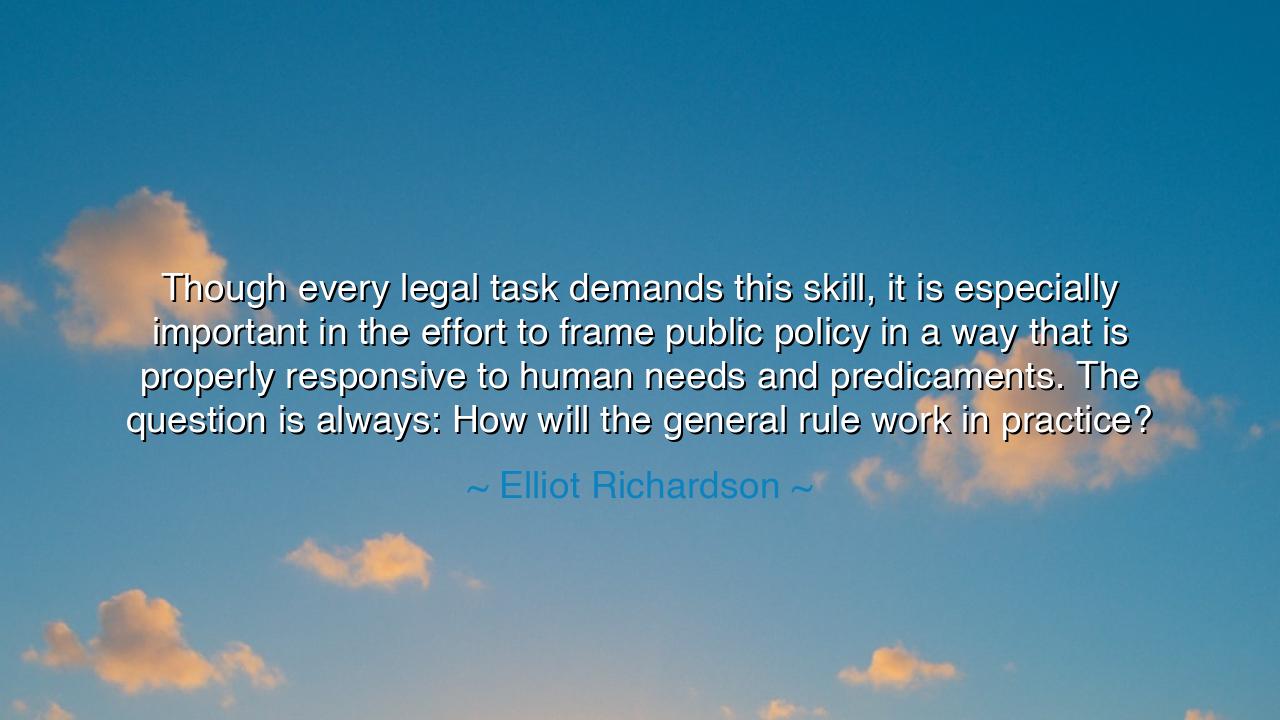
Though every legal task demands this skill, it is especially
Though every legal task demands this skill, it is especially important in the effort to frame public policy in a way that is properly responsive to human needs and predicaments. The question is always: How will the general rule work in practice?






When Elliot Richardson declared, “Though every legal task demands this skill, it is especially important in the effort to frame public policy in a way that is properly responsive to human needs and predicaments. The question is always: How will the general rule work in practice?” he spoke as both a lawyer and a philosopher, as one who had peered into the heart of governance and seen the danger of abstraction detached from compassion. His words echo with the weight of experience — for he was a man who had stood in the halls of power, yet never forgot the faces of the people those halls were meant to serve. In this reflection lies a timeless warning: that law and policy are not sacred because they are written, but only because they serve humanity.
The origin of this quote is found in Richardson’s long career as a statesman and jurist — a man who held some of the highest offices in the United States, including Attorney General during one of the nation’s most turbulent eras. His name is forever bound to the “Saturday Night Massacre”, when he resigned rather than betray the Constitution during the Watergate scandal. This act of conscience, rooted in his reverence for law as moral duty, gave him authority when he later spoke of the challenge of shaping just policy. To Richardson, the essence of law was not found in the rigid language of statutes, but in the art of applying principles to life — to the unpredictable, often painful realities of human existence.
In saying, “The question is always: How will the general rule work in practice?” Richardson confronts the eternal tension between theory and reality. It is easy for lawmakers, scholars, and even philosophers to craft perfect rules upon parchment, yet those rules often stumble when they meet the crooked roads of the human heart. A law that looks fair in the abstract may crush the poor in practice; a policy meant to protect may instead suffocate the very freedom it was designed to preserve. Thus, Richardson reminds us that wisdom, not cleverness, is the foundation of justice. To craft a rule is easy; to ensure that rule uplifts, rather than oppresses, is the true test of a statesman’s soul.
This principle can be traced to the ancients, who understood that law must be alive, not static. Solon of Athens, one of history’s first great lawmakers, once said that he gave the Athenians not the best laws imaginable, but the best they could live with. He knew that a rule must bend toward the reality of its people, or it would shatter both itself and those bound by it. In this same spirit, Richardson’s words call upon those who govern to look beyond the letter of law to the life it touches. Public policy, he insists, must not serve ideals alone, but the beating hearts of men and women struggling with the world’s burdens.
There is also in his words a deep humility — the understanding that law is not omniscient. Richardson’s phrase, “responsive to human needs and predicaments,” is a quiet acknowledgment that life forever outpaces legislation. No code, no constitution, however noble, can foresee every sorrow or injustice. Thus, those who wield the power to govern must do so with empathy, ever questioning how their “general rule” will work upon those unseen — the laborer, the widow, the child. This is not weakness, but strength of a higher kind: the courage to temper reason with compassion.
Consider the story of Abraham Lincoln, another man of law and conscience. When faced with the agony of civil war, Lincoln suspended certain constitutional rights — a decision that troubled him deeply — yet he did so not out of contempt for the law, but out of love for the nation’s survival. He knew, as Richardson later would, that law must breathe with the needs of the living, or it becomes a tomb for justice itself. Both men understood that rules are not holy; only principles are. The rule must serve the principle, and the principle must serve the people.
Let this teaching endure through time: laws are not ends, but instruments. They are tools, imperfect yet essential, by which we strive to bring order to the chaos of human life. But a rule, however noble in writing, becomes cruelty if it ignores those it governs. Therefore, the wise must always ask — as Richardson taught — “How will this rule work in practice?” Will it heal, or will it harm? Will it lift, or will it crush? To answer wrongly is to build tyranny in the name of order.
And so, the lesson for all who govern, teach, or lead is this: do not fall in love with systems — fall in love with justice. For justice is not a doctrine written on stone, but a flame carried in the hearts of those who seek to understand before they decree. The law must serve life, or it betrays its purpose. In the end, Elliot Richardson’s wisdom endures as a beacon to every generation: that the true art of leadership lies not in making rules, but in ensuring those rules work for the good of the human spirit.






AAdministratorAdministrator
Welcome, honored guests. Please leave a comment, we will respond soon